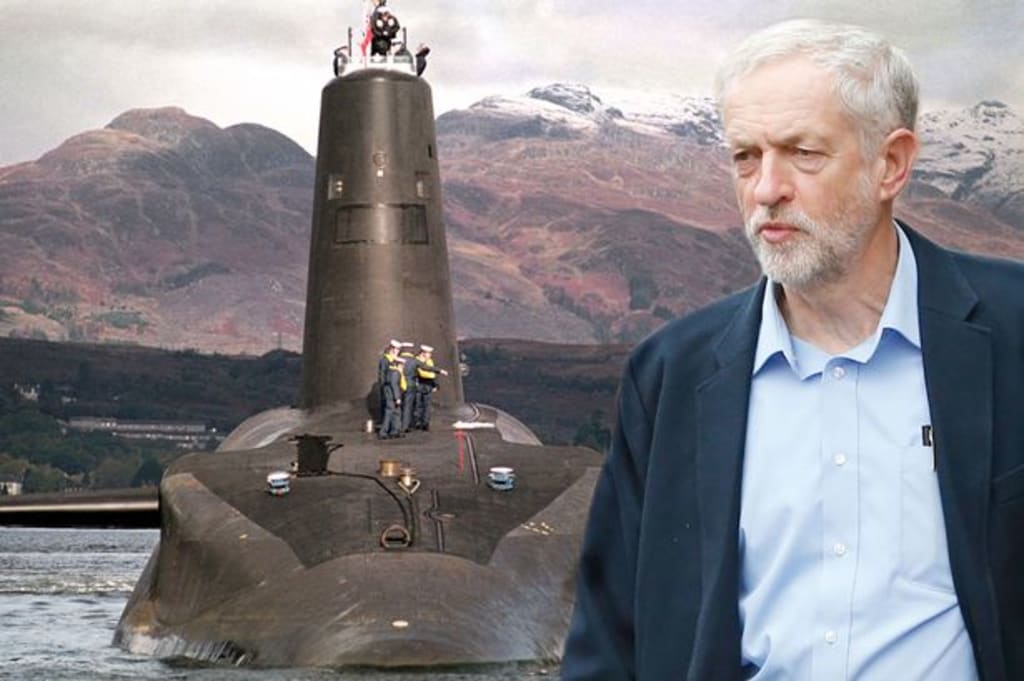Jeremy Corbyn and Nuclear Weapons: The Red Button Excuse
The Truths and Falsehoods Published About Corbyn's Stance on Trident and Nuclear Weapons

Jeremy Corbyn was made leader of the Labour Party on the 12th of September, 2015. Ever since then, he has been a talisman for social care, those opposing austerity in all areas of society, and the younger generation seeing the possibility of their vote making an actual change in society.
Since his first appearance in parliament as the MP for North Islington after the 1983 general election, Corbyn has split opinion in many of his policies. One of the most dividing, however, is his policy on nuclear weapons. Throughout his career, he has always been a supporter of nuclear disarmament and a "conversation over conflict" policy; however, it is clear that over the years this has had an effect on potential voters.
The Labour Party made up significant ground in the 2017 election with the youth vote having a massive impact. Corbyn is, however, yet to gain the vote from many of the older generation, with many deeming him "weak" because of his assumed absolute pacifist views, especially in terms of Trident and nuclear weapons as a whole, rallying around the echoing statement: “He would never push the red button.”
Conservative spin doctors and media outlets such as the Daily Mail have played up to this, portraying him as a weak leader and a coward because of his apparent inability and flat out refusal to ever retaliate with nuclear weapons should Britain be set about with the same force.
The idea that Corbyn is a total pacifist is false. He has stated that although "the whole purpose of his life" has been to oppose violence and war, in a number of cases, conflict has been necessary. For example, the Spanish Civil War and the British Naval Blockade of Africa in 1808 to stop the slave trade. His reputation came primarily from opposing and protesting against the Thatcher government during the Falklands War and against the Blair government during the phony search for WMDs in Iraq. Some voters view his voting history in this area as encouraging and that of a man willing to change the direction of British foreign policy and conflict. Some, however, believe this as a weakness of character and have only had this confirmed by conservative news outlets. Although Corbyn has made it difficult to change the minds of those who prefer a confrontational foreign policy and are under the illusion Britain are still the imperialist power of earlier years, the new generation of younger voters have not been swayed by the smear campaign of the 2017 General Election.
More specifically Corbyn’s policies in terms of Britain’s nuclear capabilities have been twisted beyond recognition, especially throughout the 2017 election campaign. It was reported that in 2015 Corbyn told BBC Radio 4’s Today Programme that as Prime Minister he would not use nuclear weapons. His words here were misquoted and manipulated to the conservative election agenda.

Throughout the GE campaign of 2017, Corbyn said a number of times, when asked "would he press ‘the red button,'" most notably in an interview with David Dimbleby on 2nd June, that he acknowledged that millions would die should he do that. When pressed by an audience member and Dimbleby, he said that he would have to assess the circumstances at the time and make a calculated decision. Was this a man that, when it came down to it, would refuse to "press the red button" and launch nuclear weapons (which would already mean total annihilation of the British Isles); or is this a man that is fully aware of the capability and drastic consequences of the use of nuclear weapons and will not abandon his lifelong held values for votes?
The "red button" argument has been at the centre of controversy for Jeremy Corbyn, and now as tensions in Europe increase over Brexit and the recent Salisbury nerve agent poisoning, it may become more of a focal point for his opponents. Although it may become more difficult for Corbyn to convince swing voters, his abandonment of New Labour politics and the steady replacement of Blairite MPs within the party over time may become attractive for labours voters that felt betrayed by Blair’s government.
Although "the red button" argument will always deter some, others see his determination to avoid conflict as a refreshing change in modern politics and British foreign policy.






Comments
There are no comments for this story
Be the first to respond and start the conversation.